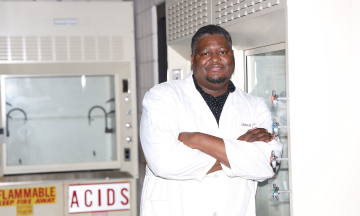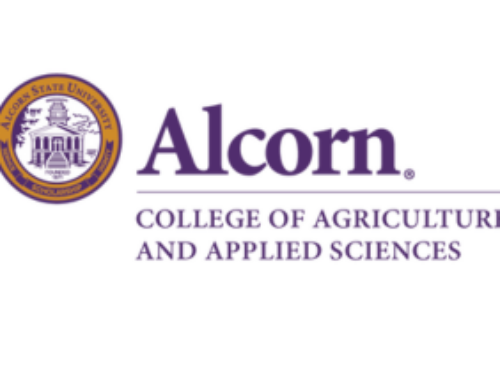Cooper honored as a Takeda Faculty Fellow awardee
Dr. Stefan Cooper, a former assistant professor in the Department of Chemistry and Physics at Alcorn State University, has been named a Takeda Faculty Fellow.
This highly competitive program, sponsored by Takeda Pharmaceuticals, is designed to support and recognize faculty dedicated to advancing research and education in science, technology, engineering, and mathematics (STEM).
“Dr. Stefan Cooper’s research has the potential to launch new exploits into biomedical and agriculture science, areas that could have a significant impact on the institution and its student body,” said Jabreel Walker, director of the Cargill, Takeda, and Strada Scholars Program. “Alcorn State University congratulates Dr. Cooper on being named a Takeda Faculty Fellow and looks forward to seeing the outcomes of his research and impact on the campus community.
Cooper received a $5,000 allowance as a Takeda Faculty Fellow to support his research efforts.
The funds can be used to pay undergraduate and graduate student researchers in the lab, purchase lab supplies, travel to professional conferences, or pay for summer salary. In addition, Cooper will serve as a campus mentor for the Takeda Scholars Program (TSP) students and travel with students on a Takeda site visit.
“I am humbled to have been selected as a Takeda Fellow at Alcorn State University,” said Cooper. “It is a passion and a deep desire to incorporate undergraduate research within traditional college chemistry education. The fellowship allows research support to pay undergraduate researchers a stipend for work in the laboratory. Being selected as a Takeda Fellow felt rewarding for prior efforts and has encouraged continued efforts in undergraduate research. I am much appreciative of the fellowship!”
Cooper’s research project focuses on changing a group of molecules called arylazopyrazoles, which are known as molecular photoswitches. Molecular photoswitches can transform into two different shapes when they absorb a specific type of light. Most molecular photoswitches absorb ultraviolet light with a wavelength of around 365 nanometers. However, ultraviolet light is very powerful and can cause harm, making it difficult to use most molecular photoswitches in biomedical research.
The group has begun modifying molecular photoswitches based on arylazopyrazoles to work with light used in medical settings, specifically near-infrared light. Near-infrared light, which has a wavelength range of 800-1000 nanometers, can penetrate deep into tissues and is safer for interactions with living cells due to its lower energy. The goal is to use these modified molecular photoswitches with clinical light to develop a new drug delivery method by using light as a trigger. This photo-triggered drug delivery system could offer an alternative to conventional oral chemotherapy treatments.
Cooper noted undergraduate students have learned how to create and study small organic molecules, as well as analyze their properties using a technique called FT-IR (Fourier transform infrared) spectroscopy.
“Additionally, students have learned techniques for evaluating the photo performance of molecular photoswitches by ultraviolet-visible light spectroscopy. Students will present research results at the 50th National Organization for Black Chemists and Chemical Engineers (NOBBChe) in New Orleans in September 2023.”




